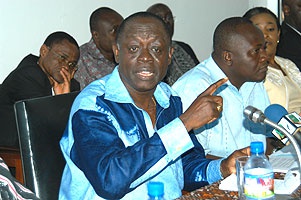- Home - News
- TWI News | TV
- Polls
- Year In Review
- News Archive
- Crime & Punishment
- Politics
- Regional
- Editorial
- Health
- Ghanaians Abroad
- Tabloid
- Africa
- Religion
- Election 2020
- Coronavirus
- News Videos | TV
- Photo Archives
- News Headlines
- Press Release
General News of Wednesday, 2 April 2003
Source: gna
Budgetary allocation to Tourism Ministry is "Peanut"

Mr Kwamena Bartels, outgoing Acting Minister of Tourism, on Tuesday described budgetary allocation to the Ministry as "peanuts" saying, the amount is not capable of developing the industry to competitive levels in the Sub-Region.
He said the budget allocated to the Ministry was limited and was a serious constraint to raising the standards in the tourism industry.
Mr Bartels, who was addressing the Meet-The-Press Series in Accra, said he was, however, optimistic that programmes, projects and effective collaborative efforts by the Ministry and its agencies - Ghana Tourist Board, Ghana Tourist Development Company and the Hotel Catering and Tourism Training Institute (HOTTCAT) - would work to bridge the financing gap.
The Minister of Finance in the 2003 budget allocated 13.6 billion cedis to the Ministry of Tourism with 1.6 billion cedis going for investment and development purposes.
Mr Bartels said poor and inadequate infrastructural facilities at tourism sites across the country had suffered because of a continued low budgetary allocation to the sector
He expressed the hope that the private sector would aid the ministry and government to realise the changing tastes and expectations of tourists, who visit the country and bring Ghana to the new heights of international tourism.
Tourism is the nation's fourth largest foreign exchange earner after cocoa, gold and timber, earning more than a billion cedis in the past year alone.
Tourism has potential if given necessary attention- Bartels
Tourism has the potential of overtaking cocoa, gold and timber earnings if government, the private sector and other stakeholders give it the necessary attention and support that it deserves, Mr Kwamena Bartels said in Accra on Tuesday.Taking his turn at the monthly Meet-The-Press series, the out-going Minister said tourism must be seen as an instrument for creating wealth by transforming Ghana's natural resources to marketable products.
"This would encourage both international and domestic tourism in Ghana, help achieve growth and reduce poverty among the urban and rural poor."
He said tourism brought in a total of 519.5 million dollars last year as against 447.8 million dollars posted in the previous year. The sector provided 386 million dollars in 2000.
Giving a performance of the Ministry in the last two years, Mr Bartels said 45 new slave routes have been identified for development.
They include the slave wells at Salaga, Sampa Slave Market and the Colonial Officers' Graves and the Jinini Mass Grave for Slaves.
He said the Bobiri Butterfly Sanctuary, Weschiau Hippopotamus Sanctuary, Domama Rocks, Tongo Rocks and the Tengzuk Shrine in the north are to be developed under the community-based tourism project in association with the Nature Conservation Research Centre (NCRC) and the US Peace Corps.
"The purpose of these initiatives is to create opportunities for the rural people to earn incomes while conserving their local ecosystems, " he added.
He said the Ministry had taken steps to construct receptive facilities at eight sites across the country through the benefits from the HIPC funds.
The sites are the Wli Falls in the Volta Region, Assin Manso and Praso Slave Routes all in the Central Region, the Naa Gbewaa Shrine in Pusiga and the Oda Big Tree also in the Eastern Region, the Ejisu/Bonwire Kente weaving sites in the Ashanti Region, the Mighty Beach at Nungua in Accra and the Kintampo Falls in the Brong Ahafo Region.
On marketing of the nation's tourism sites, Mr Bartels said, "5,000 copies of tourist maps of Ashanti Region, 12,360 copies of Festivals of Ghana brochure and 20,300 copies of AKWAABA brochure and a documentary film on Ghana's Tourism attractions have been sent out to Ghana's foreign missions, tour operators and investors."
He said the issues of domestic tourism had caught the attention of government, and domestic tourism has been intensified through the formation of tourist clubs among first and second cycle schools.
Mr Bartels said the Ministry organized sensitisation workshops for 475 personnel in the public and private sector on the HIV/AIDS, noting that," information, education and communication materials on the disease have been produced and distributed for the use of hotels and tourist facilities."
The out-going Minister said a website had also been set up jointly with the private sector and other agencies to consolidate information on tourism in the country.










